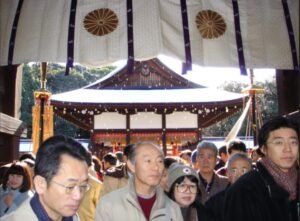The Japanese language ranks among the top 10 most spoken languages in the world by total number of native speakers, with 128 million people, according to research by Ethnologue, a website that analyzes the global population. Additionally, there is a growing interest among people from other nationalities in learning Japanese.
This interest in learning Japanese is due to Japan’s significant cultural, technological, and economic prominence. Apart from tourism, there are other compelling reasons to learn Japanese, as listed below by Professor Maurício Kanno.
Japanese Culture
Undoubtedly, one of the most appealing aspects of Japan is its extremely rich culture. Dramas (Asian series), anime, manga, pop music, and video games are some of the cultural elements that have crossed the country’s borders and are consumed daily by thousands of people around the world.
This affinity with Japanese culture leads many people to want to learn Japanese. Studying the language can help enthusiasts of this culture better understand the cultural and social context of these productions. Additionally, learning Japanese helps in watching cultural productions in their original language, avoiding the loss of some expressions and aspects specific to the language that are part of the immersion process in the culture and may be lost in translation.
Professor Maurício Kanno highlights that culture has been a decisive factor in learning the language. “Most of my students are not from Japanese families. They enjoy learning Japanese because they like Japanese culture, just as there are many people in Brazil who learn English, Spanish, Italian, German without having families originating from those countries.”
Learning Japanese helps to stand out professionally
Knowing Japanese can mean an opportunity in the corporate world or a promotion. The language on the resume is a standout, and professionals with specific skills are always in demand by companies. Additionally, there are many job opportunities in Japan, and knowing the language can be a step towards these opportunities. Professor Maurício Kanno comments that many students pursue the language for professional purposes, ‘Whether in a multinational company in Brazil, where the person wants to advance their career, or even in Japan, where the person was working in a factory and wanted to learn Japanese to improve communication, especially to reach higher positions,’ Kanno emphasizes.
Japanese as a heritage language
Finally, it is worth noting that Brazil has the largest Japanese community outside of Japan. According to data from the Mundo Nipo website, the population of descendants and Japanese people in the country in 2019 totaled more than 1.6 million people. However, the reverse movement also occurs, as Brazilians form the largest group of “non-Asian” individuals in Japan. The connection between the two nations is undeniable.
For this reason, many Brazilians have Japanese relatives. This is another reason why learning Japanese can be interesting for those with relatives from Japan, as learning the language provides a connection to ancestry.
“There are many people like me who are drawn by family. I have my paternal grandparents who came from Japan around 1930. This sentimental and emotional aspect connects a person to the language, and for me, this aspect influenced me. Many students have Japanese family and bring it as a heritage language,” comments Professor Maurício.
Lastly, it is worth remembering that learning a new language is always an excellent activity that brings various neurological and cognitive benefits.
After considering these reasons, it is evident that learning Japanese can be a great personal investment for those who enjoy Japanese culture or have relatives from Japan, and professionally for those who want to advance their career in Brazil or take advantage of job opportunities in Japan. Regardless of the motivation to learn Japanese, the team at Japonês Criativo is available to teach the language with fun and efficient classes.





